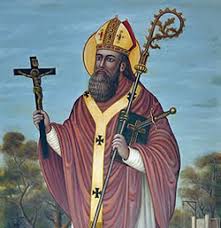HOMILY WEEK 09 06 – Year I
Almsgivers in the Spirit:
Memorial of St. Boniface
(Tob 12:1-20; Tob 13:2-6; Mk 12:38-44)
******************************************
“Prayer with fasting is good, but better than both is almsgiving with righteousness.”
That sentence from the Book of Tobit literally leaps out at the reader, demanding our attention. It also provides an important message for us today – to strive to be great almsgivers in the Spirit.
If we look at the liturgical year from a fresh perspective, Ascension Sunday can be seen as similar to Palm Sunday, and the week that follows a second Holy Week, an upper room experience of vigil, in anticipation of and preparing for the feast of Pentecost that completes the Paschal Mystery.
Within this view, the ninth week of Ordinary time this year would actually become the first week of Season of Pentecost that would last until Advent. Our mandate as Christians filled with the Holy Spirit, is to do what the first Christians did – burst out of the confines of fear and hesitation, to spread the joyful news of Jesus Christ, the Messiah who is risen from the dead. We are to above all forgive those who hurt and even persecute us, from the heart, and make happen here on earth what is already happening in heaven.
That sentence by the angel Raphael recalls the Lenten discipline of prayer, almsgiving and fasting, but adds a new depth of meaning to them. Prayer with fasting is good, but not as good as almsgiving with righteousness. The reason may be that prayer and fasting can be self-serving and even become addictive, as it did for the scribes in the gospel, who say long prayers for the sake of appearances.
Almsgiving (giving of one’s self) with righteousness (a right relationship with all) is a more pure and challenging discipline, harder to fake. To give alms is not just giving money, but also affirming others, encouraging others, lifting others up, complimenting others, forgiving others, trusting others and truly caring for their well-being. It is to be a blessing to others. A blessing is that which gives life and energy to others. A curse is not really swearing (that is just colorful language) but rather words that put others down, criticize them, sap their energy and take life away from them.
Righteousness is a right relationship with God (I am reconciled with God); a right relationship with all others in my life (I have forgiven and received forgiveness from others); a right relationship with myself (I have accepted myself as I am, love myself and have forgiven myself for my past mistakes) and finally, a right relationship with all of God’s creation (I am doing what I can to care for mother earth). Again, according to the angel Raphael, almsgiving with righteousness is better than prayer with fasting.
This fits beautifully with the criteria for entrance to the Kingdom of heaven in Matthew 25, which is the corporal works of mercy (feeding the hungry, caring for the sick, visiting prisoners, giving drink to the thirsty, clothing the naked, etc.) This is much more demanding than simply praying and fasting, good as those are.
St. Mother Theresa of Calcutta had it right – what we would like to do to Jesus whom we cannot see, we should do to our neighbor whom we can see, and we will be doing it to Jesus. Living this teaching out would make it more difficult to be a hypocrite – being a lay minister, for example, yet secretly sinning on the side. Hypocrisy and unbelief were the main sins of the scribes and Pharisees that bothered Jesus the most.

St Boniface
Today the church honors St. Boniface, who lived fully today’s teachings. He was born around 680 in Devonshire, England, given the name Wynfrid and was raised in Benedictine monasteries. By 717, he was a renowned teacher and preacher, but gave up his work in response to a call to the mission field of northern Netherlands. In Rome, Pope Gregory II renamed him Boniface. He was made archbishop of Mainze by Pope Gregory III. He was one of the truly outstanding creators of early Europe as the apostle of Germania. Through his efforts to reorganize and regulate the church of the Franks, he helped shape Western Christianity, and many of the dioceses he proposed remain today. At Geismar, Boniface made a tremendous impression by destroying the great Oak of Thor, an object of pagan worship, without being harmed by “the gods” (a missionary practice we would question today).
Boniface is called the “Apostle of Germany.” He was martyred in Frisia in 754, along with 52 others, and his remains were returned to Fulda, where they rest in a sarcophagus which became a site of pilgrimage. Boniface’s life and death as well as his work became widely known. After his martyrdom, he was quickly hailed as a saint in Fulda and other areas in Germania and in England. His cult is still notably strong today. Boniface is celebrated (and criticized) as a missionary, but he is regarded as a unifier of Europe, and is seen (mainly by Catholics) as a Germanic national figure.
The Eucharist is God blessing us, loving us, giving God’s self to us. Knowing how much God in Jesus has loved us, and believing in that love, is our foundation and source of security.
It is that secure foundation that will make it possible to forgive ourselves and empower us to give ourselves to others, to be great almsgivers in the Spirit



